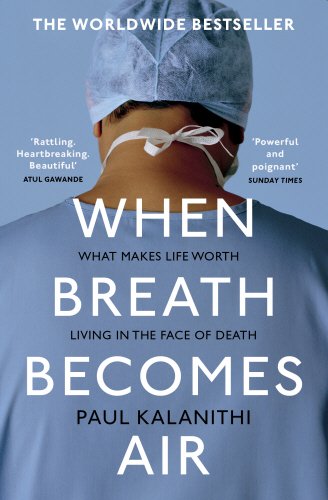Here is another highlights post from me. This time highlights are from When Breath Becomes Air by Paul Kalanithi and Abraham Verghese.
Page 31
Literature not only illuminated another’s experience, it provided, I believed, the richest material for moral reflection.
Page 39
A word meant something only between people, and life’s meaning, its virtue, had something to do with the depth of the relationships we form.
Page 39
It was the relational aspect of humans—i.e., “human relationality”—that undergirded meaning.
Page 101
He paused. “Paul,” he said, “do you think my life has meaning? Did I make the right choices?” It was stunning: even someone I considered a moral exemplar had these questions in the face of mortality.
Page 114
Our patients’ lives and identities may be in our hands, yet death always wins. Even if you are perfect, the world isn’t. The secret is to know that the deck is stacked, that you will lose, that your hands or judgment will slip, and yet still struggle to win for your patients.
Page 120
Severe illness wasn’t life-altering, it was life-shattering. It felt less like an epiphany—a piercing burst of light, illuminating What Really Matters—and more like someone had just firebombed the path forward. Now I would have to work around it.
Page 120
Death, so familiar to me in my work, was now paying a personal visit. Here we were, finally face-to-face, and yet nothing about it seemed recognizable.
Page 126
(Alexander Pope: “A little learning is a dangerous thing; / Drink deep, or taste not the Pierian spring.”)
Page 131
I began to realize that coming in such close contact with my own mortality had changed both nothing and everything. Before my cancer was diagnosed, I knew that someday I would die, but I didn’t know when. After the diagnosis, I knew that someday I would die, but I didn’t know when. But now I knew it acutely. The problem wasn’t really a scientific one. The fact of death is unsettling. Yet there is no other way to live.
Page 162
Maybe, in the absence of any certainty, we should just assume that we’re going to live a long time. Maybe that’s the only way forward
Page 166
But if I did not know what I wanted, I had learned something, something not found in Hippocrates, Maimonides, or Osler: the physician’s duty is not to stave off death or return patients to their old lives, but to take into our arms a patient and family whose lives have disintegrated and work until they can stand back up and face, and make sense of, their own existence.
Page 169
The problem, however, eventually became evident: to make science the arbiter of metaphysics is to banish not only God from the world but also love, hate, meaning—to consider a world that is self-evidently not the world we live in.
Page 169
That’s not to say that if you believe in meaning, you must also believe in God. It is to say, though, that if you believe that science provides no basis for God, then you are almost obligated to conclude that science provides no basis for meaning and, therefore, life itself doesn’t have any. In other words, existential claims have no weight; all knowledge is scientific knowledge.
Page 170
The favorite quote of many an atheist, from the Nobel Prize–winning French biologist Jacques Monod, belies this revelatory aspect: “The ancient covenant is in pieces; man at last knows that he is alone in the unfeeling immensity of the universe, out of which he emerged only by chance.”
Page 172
Human knowledge is never contained in one person. It grows from the relationships we create between each other and the world, and still it is never complete.
Page 180
As in most modern narratives, a character’s fate depended on human actions, his and others.
Page 198
Graham Greene once said that life was lived in the first twenty years and the remainder was just reflection.
Page 216
Conversely, we knew that one trick to managing a terminal illness is to be deeply in love—to be vulnerable, kind, generous, grateful.
